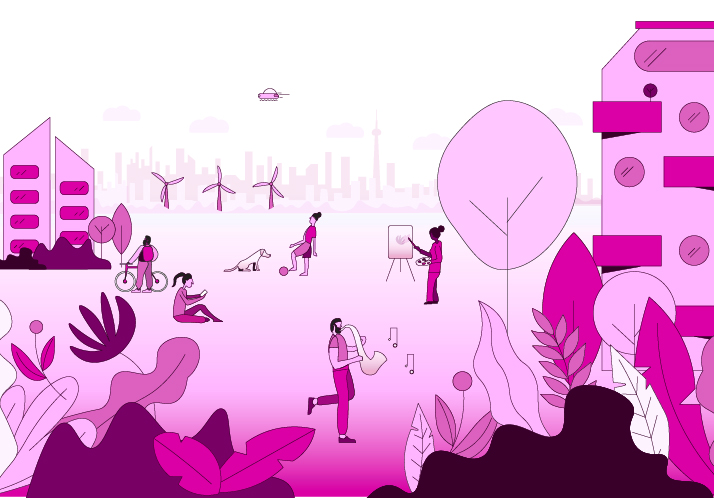
Alphabet-owned Sidewalk Labs (known as ‘Sidewalk Toronto’ in Toronto) has released their draft Master Innovation and Development Plan (MIDP), Toronto Tomorrow: A New Approach for Inclusive Growth.
This plan is a product of 18 months of input from more than 21,000 people. Sidewalk Labs spoke with Toronto community members, government officials, and non-profits; and the research, engineering, and design work of more than 100 Toronto firms was considered. The plan outlines how a piece of Toronto’s waterfront can become a diverse live-work community that dramatically improves the quality of life for those who live there.
You can learn more about the plan and download a copy for yourself at sidewalktoronto.ca.
A city “built from the internet up” is how some have perceived this plan. Concerns over privacy, data ownership, and the private development of public lands have people talking. These issues are critically important and deserve more discussion, but, if you dig into the plan you’ll find they’ve identified something with the potential to positively impact Toronto and beyond: the use of mass timber (engineered wood building systems) as a sustainable low-carbon construction solution.
We think that sustainable mass timber can help us tackle two of the biggest challenges cities face: climate change and lack of affordable housing.
Climate change
Cities play a major role in climate change. They house most of the world’s population and generate the majority of the world’s carbon emissions. The construction of buildings is a big part of those emissions. We need solutions.
Sustainable mass timber does many things really well like creating beautiful, biophilic spaces, and lending itself to rapid on-site assembly that reduce construction costs. But one of the biggest benefits of mass timber is its ability to lock up carbon in the cellulose it’s made of. A 20-story mass timber building can store up to 3,000 tons of carbon versus 1,200 tons of carbon emitted were it built with traditional materials like steel and concrete. That’s a potential reduction of over 4,300 tons net–if the timber is sustainably harvested. Sixty percent of the carbon in a forest is stored in the ground and is emitted into the atmosphere if the forest is harvested by clear cutting.
Sidewalk Labs has proposed investing up to $80-million in a sustainable mass timber factory in Ontario to jump-start the industry. We think that mainstream availability of sustainable mass timber, coupled with a strong sustainability focus in the design sector, can help build a stronger and more accountable market for sustainably harvested mass timber. So will partnerships like DIALOG’s collaboration with Community Forests International that’s promoting sustainable forestry practices in Canada and abroad. But most importantly, having large scale developments constructed of sustainable mass timber will be essential to our ability to reduce our urban carbon footprint.
Affordable housing
Affordability is a global issue that’s also close to home for DIALOG: three of our five studios are in cities that are experiencing significant affordability issues. Vancouver house prices rose 16% in 2018, placing it fourth in the world among major cities. Toronto was ranked fifth-least affordable city in the world in the 2017 in the Demographia International Housing Affordability Survey. And San Francisco’s housing crisis is well documented with Fortune noting in 2018 that a family of four earning $117,000 or less is considered “low income.”
If we’re going to create livable cities with vibrant, healthy and diverse communities we’ll need to find effective ways to address affordability. We believe sustainable mass timber could be part of the solution. A project at the scale of Sidewalk Toronto can help establish the industry in Ontario and beyond. As the market grows, engineered timber prices will come down, and design innovations and prefabrication strategies–like the ones we’re working on right now–can help to further reduce costs. We expect modular pre-fab timber buildings will help tackle affordability issues with potential construction cost reductions of 20% to 40%. In its MIDP, Sidewalk Toronto states that it plans to make 40% of residential units available at below-market rates with 20% of total units meeting the traditional definition of affordability. That’s a great idea we fully support and want to be a part of.
At DIALOG, we believe great design can change the world. And the better world of tomorrow is one where our communities enable everyone to thrive – where cities promote wellbeing, are affordable, diverse and inclusive, and do their part to combat climate change. The sustainable mass timber component of Sidewalk Toronto’s proposal can help us all take a first, giant step in that direction. We’re ready.